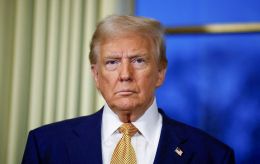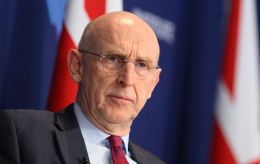Biden and Macron set to announce ceasefire between Israel and Hezbollah - Reuters
 Israel and Hezbollah may cease fire and shelling (Illustrative photo: Getty Images)
Israel and Hezbollah may cease fire and shelling (Illustrative photo: Getty Images)
US President Joe Biden and French President Emmanuel Macron are expected to announce a ceasefire between Israel and the Hezbollah group in Lebanon within 36 hours. However, not everyone in Israel is satisfied with the proposed ceasefire agreement, reports Reuters.
White House national security spokesperson John Kirby stated in Washington that they are close to finalizing the agreement. However, he emphasized that nothing is done until everything is done.
The French presidency noted that significant progress has been made in the negotiations for the ceasefire. A high-ranking Israeli official in Jerusalem indicated that the Israeli government would convene on Tuesday, November 26, to approve the ceasefire agreement with Hezbollah.
Prime Minister Benjamin Netanyahu's office declined to comment on reports regarding the agreement text. However, the Israeli official told Reuters that the Israeli Cabinet plans to approve the text of the agreement on Tuesday.
Earlier, Israeli officials had mentioned that the ceasefire agreement was nearing completion, though some issues remain unresolved. Two senior Lebanese officials expressed cautious optimism, even as Israeli airstrikes and Hezbollah's rocket attacks continue.
Serious obstacles have been overcome
Israel's ambassador to the United Nations, Danny Danon, stated that the Israeli government would maintain the ability to strike southern Lebanon under any agreement. This comes despite the Lebanese government's earlier opposition to wording that would grant Israel such a right.
In Beirut, Elias Bou Saab, Lebanon's deputy parliament speaker, told the agency that there are no serious obstacles left for the implementation of the proposed US-led ceasefire regime with Israel, unless Netanyahu changes his mind.
He noted that the proposal includes the withdrawal of Israeli forces from southern Lebanon and the deployment of the regular Lebanese army in the border region, which has long been a stronghold of Hezbollah, within 60 days.
According to Saab, the issue of who would oversee the implementation of the ceasefire has been resolved in the past 24 hours. A five-nation committee, led by the US, will be responsible for this. One of these countries is France.
Cautious skepticism
Meanwhile, the administration of US President Joe Biden has emphasized diplomatic efforts to end the conflict in Lebanon, despite the total freeze of all negotiations regarding the parallel war in the Gaza Strip.
Diplomacy regarding Lebanon is focused on restoring a ceasefire regime based on United Nations Security Council Resolution 1701, which ended the last major war between Israel and the group in 2006.
The resolution requires Hezbollah to withdraw its fighters approximately 30 km from the Israeli border, beyond the Litani River, while the regular Lebanese army is to enter the border region.
Israel and Hezbollah have accused each other of failing to implement the agreement in the past. Tel Aviv claims that the new ceasefire should allow it to strike all Hezbollah fighters and weapons remaining south of the river.
The deal could also reveal splits within Benjamin Netanyahu’s right-wing government. Far-right national security minister, Itamar Ben-Gvir stated that Israel should continue the war until absolute victory, urging Netanyahu, "It is not too late to stop this agreement!"
In northern Israel, several mayors of border towns expressed dissatisfaction with the prospects of a ceasefire. They fear that the monitoring provisions will not prevent Hezbollah from reestablishing its positions in the border region.
Additionally, on November 14, the US ambassador to Lebanon, Lisa Johnson, handed over the draft ceasefire agreement to the Lebanese government.
Israel-Hezbollah war
Since the beginning of the war between Israel and the Palestinian group Hamas in the Gaza Strip, Hezbollah militants, supported by Iran, have begun launching rockets at Israeli territory.
In recent months, mutual shelling has escalated significantly, and in early October, the Israeli army entered southern Lebanon to push the terrorists further away from the border between the two countries.
Despite the reported progress in negotiations, hostilities have intensified. Over the weekend, Israel carried out powerful airstrikes on Beirut, one of which killed at least 29 people. In response, Hezbollah fired 250 rockets at Israel.
On November 23, the Israeli army attacked Islamist targets in the Lebanese district of Dahieh and central Beirut.
The day before, the IDF struck Hezbollah's weapons manufacturing centers in Beirut.

